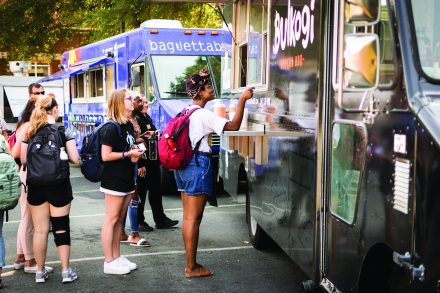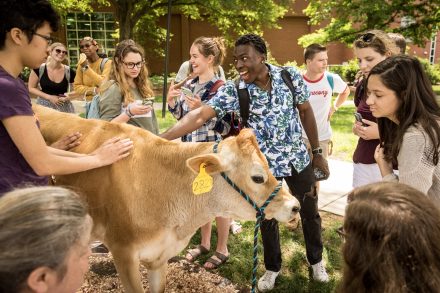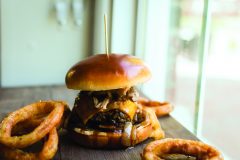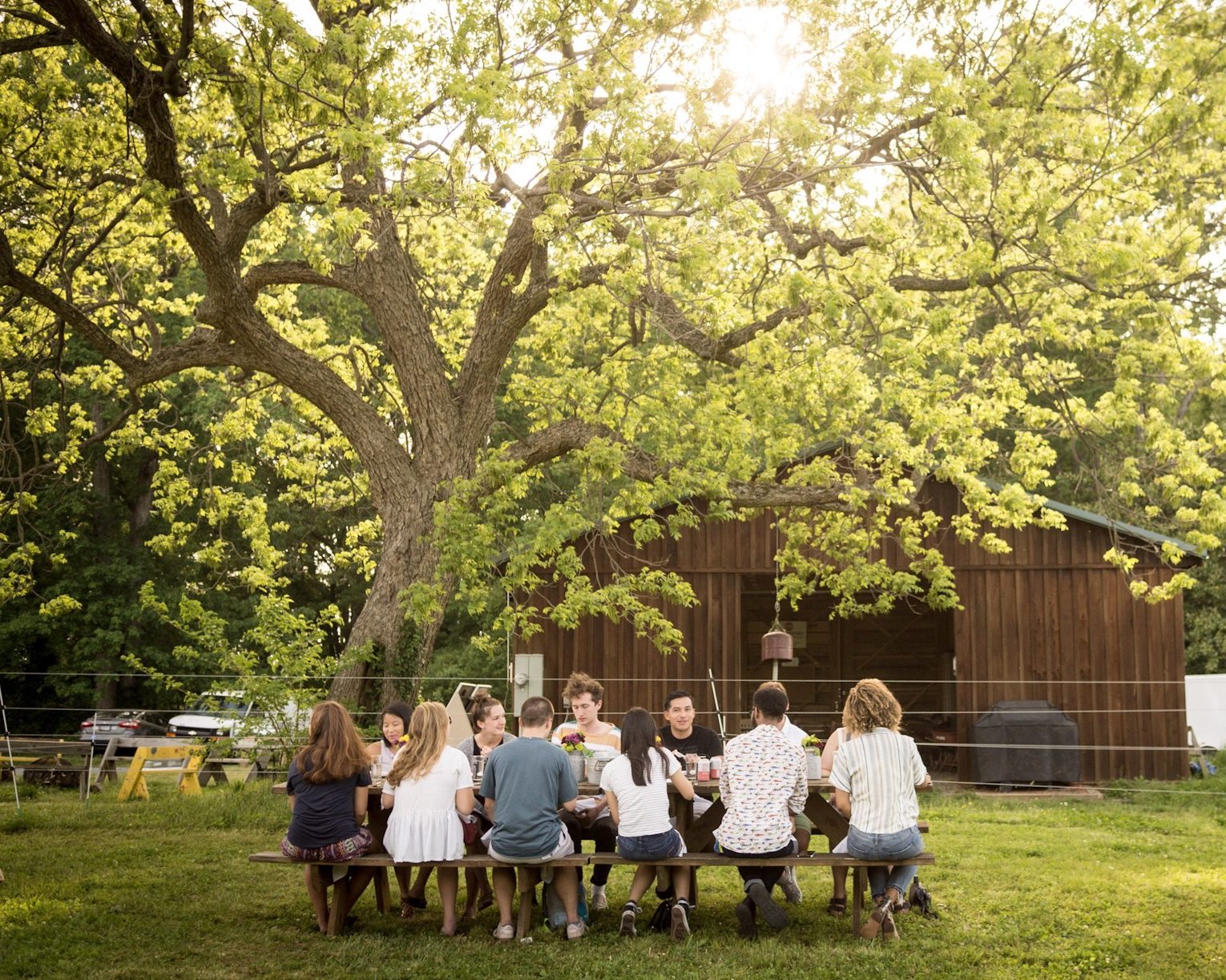Elon’s dining hall cuisine has evolved to provide organic, sustainable and locally sourced ingredients for a better dining experience.
 Spicy tacos made with humanely raised beef on handmade tortillas. Creamy macaroni and cheese just like grandma used to make. A cornmeal pancake topped with braised pork cheek, fried collard greens, a pimento cheese fritter and local apple chutney.
Spicy tacos made with humanely raised beef on handmade tortillas. Creamy macaroni and cheese just like grandma used to make. A cornmeal pancake topped with braised pork cheek, fried collard greens, a pimento cheese fritter and local apple chutney.
It sounds like a foodie’s dream, right? It’s also what’s for lunch or dinner at McEwen, Lakeside or Clohan — Elon’s three dining halls.
From locally sourced, simple ingredients to weekly menus created by on-site chefs, restaurant takeovers, food trucks, impromptu pop-ups, teaching kitchens, chef’s tables and farm table dinners, dining hall cuisine has evolved from the standard meat and two (canned) vegetables served cafeteria style. “We are serving food the way it is meant to be served,” says executive chef Jay Vetter of Harvest Table Culinary Group, an independent division of Aramark, which operates Elon Dining.

Two years ago, Elon was part of a pilot program with Harvest Table. Six months into the program, Harvest Table officially took over Elon Dining. “We needed a premium brand that fit premium schools, and we went out and created that brand,” says Laura Thompson, regional district manager with Harvest Table. “This generation of students expects more.”
Harvest Table strives to deliver what Elon’s students, who are part of the technology- and social media-savvy Generation Z, are seeking — trendy food choices, international cuisine and Instagram-worthy dishes made from organic, sustainable and locally sourced ingredients. If given a choice, this generation opts for street cuisine or a unique food truck experience over an inexpensive hamburger from a fast-food restaurant.
Harvest Table focuses on five culinary commitments. That means the dishes created and ingredients used are responsibly sourced, freshly made, nutritionally balanced, locally procured and additive free. “Our chefs all ask those questions. We do a lot of label reading,” Thompson says.

Attaining this level of commitment meant that the team of eight chefs initially had to find some replacements for pantry ingredients. “We had all these Asian sauces,” Vetter recalls. “We started looking at them and said, ‘Oh. We can’t serve that. It has preservatives in it.’” The chefs make their own sauces now, and instead of using pre-breaded chicken tenders, for example, they bread the poultry themselves.
The taste and quality of dining hall offerings are important to students. Daniela Nasser ’20, an admissions tour guide, says prospective students frequently ask if the food in the dining halls is good. “I can always say that it is,” Nasser says. “We have multiple dining halls and a lot of diversity within those, and the menus switch from day to day.” When she’s giving a tour, Nasser loves to pull up Elon Dining’s social media accounts to show off some of the featured dishes.
She recently experienced some Instagram-worthy moments herself when she was selected to participate in a farm table dinner hosted by Elon Dining. The dinners, offered a few times a semester, are held in various scenic spots on campus. Interested students are randomly selected through social media. The popularity of the free multi-course meal, which begins with an amuse-bouche (a single-bite hors d’oeuvre) and ends with dessert, has tripled since the dinners started last fall.

The meal Nasser attended was at Elon’s Loy Farm on South Campus and showcased locally sourced apples. While they munched away on delectable morsels prepared and plated right in front of them, students learned that the dishes were made from the same ingredients used in Elon’s dining halls. “The students are interacting with the chefs, seeing how the food is prepared, and we are talking about where the food came from,” Vetter says. “And, of course, they are taking photos and posting on Instagram. It brings an upscale restaurant feel to the students and gives the culinary team a chance to collaborate and do something different.”
One of the dishes featured fresh rainbow trout. “It was unreal,” Nasser says. “I love fish, but this was next level.” Learning about Elon Dining’s community partnerships was also a highlight of the dinner. “I appreciate an organic, locally sourced meal that really does benefit the world and community,” Nasser says. “I like the idea of supporting local businesses and not using a lot of greenhouse gases to deliver my food. It makes me happier knowing that.”
Elon Dining is committed to supporting local farmers and businesses. Preference is placed on purchasing food grown within a 250-mile radius of Elon whenever possible. In the spring, Elon Dining will begin sourcing some of its produce from Loy Farm, Elon’s sustainable farm that houses the Elon Environmental Center. Last year, Elon Dining brought a cow from Carolina Culture, a Bahama, North Carolina-based company that specializes in artisan yogurt, kefir and smoothies, to campus.

Students were able to interact with the cow and take photos outside of Lakeside Dining Hall — an opportunity to learn about where the yogurt offered in the dining halls comes from. “Carolina Culture is a small business that we found through our local produce company,” Thompson says. “And just with our partnership alone, the owner was able to grow her business.”
From the quality of the food to the importance of customer opinions, the dining hall experience has definitely evolved since Tisha Davidson ’96, Elon Dining’s director of operations, was a student at Elon. At the time, there were two dining halls, Harden and McEwen, and both were set up like a cafeteria with limited food choices — usually hot dogs and hamburgers — on the weekends. “We didn’t think about where the food we were eating was coming from,” Davidson says. “It was a filler. Now, when you are in a dining hall, it’s an actual experience.”
“I appreciate an organic, locally sourced meal that really does benefit the world and community. I like the idea of supporting local businesses and not using a lot of greenhouse gases to deliver my food. It makes me happier knowing that.” — Daniela Nasser ’20
While hamburgers, made from a blend of grass-fed beef and plant-based protein, are definitely still a dining hall option, the range of choices available to students continues to expand. Food stations that include rotisserie meats, made-to-order pasta or omelets, homestyle foods, vegetarian and vegan options, or international cuisine are popular. It is not unusual to see an area restaurant take over a food station a few times a year in order to showcase local fare.
 Elon Dining’s chefs also create special menus centered on dishes they love that they feature at a chef’s table on occasion. Last year, Vetter created a station with three different nut butters and homemade jams that he served up on bread made locally. “They’re not just plopping food on your plate and sending you out the door,” Davidson says. “It gives the chefs an opportunity to shine and the students a chance to try something that’s outside the box.”
Elon Dining’s chefs also create special menus centered on dishes they love that they feature at a chef’s table on occasion. Last year, Vetter created a station with three different nut butters and homemade jams that he served up on bread made locally. “They’re not just plopping food on your plate and sending you out the door,” Davidson says. “It gives the chefs an opportunity to shine and the students a chance to try something that’s outside the box.”



